The big bet behind Joe Biden's campaign: Let Donald Trump have the spotlight

The presidential dreams Joe Biden harboured since childhood seemed on the verge of extinction for a third, and final, time.
On an unusually cold late-winter morning in South Carolina, a few dozen people had gathered to hear him speak at a school gym.
He was getting clobbered by Sen. Bernie Sanders in the race for the Democratic presidential nomination. A virus, meanwhile, was on the verge of clobbering the United States.
Biden won South Carolina's primary on Feb. 29, then forced most rivals out of the race and romped to one of the most head-spinning comebacks in American political history.
And if he winds up winning the presidency on Tuesday, as current polls suggest is likely, let the record show that Biden was saved by Black voters in South Carolina.
Saved by people like Al Davis.
As he stood in line in the municipality of Sumter that February morning waiting for Biden to speak, the retired air force veteran laid out his political calculus for backing the former vice-president.
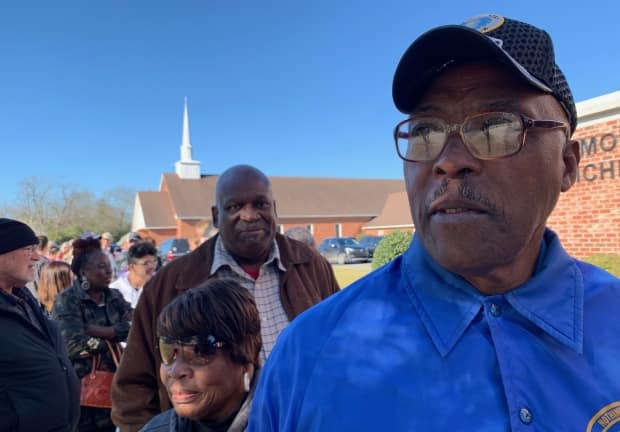
"He's the man that can beat Trump," Davis said, expressing doubts about Sanders's viability in a general election against U.S. President Donald Trump.
Biden did what came naturally to him that morning, as a self-described people-person politician who prized interaction over ideology. The scene, in retrospect, is like a remnant from a bygone pre-pandemic era.
He shook hands, lingering for an hour after his speech, posed for pictures and stood shoulder to shoulder with strangers as they posed for pictures.
Trump, meanwhile, was doing what came naturally to him.
The Republican president flew into the state for a rally, to steal the show from Democrats. Trump held huge rallies before primaries in South Carolina and elsewhere; before caucuses in Iowa and Nevada; during the Democratic convention in Wisconsin, even though few Democrats were actually in the state because they were practising physical distancing.
Trump underscored a point again, and again, all year: that he was the biggest draw.
Biden strategy: A Trump, Trump, Trump election
The president might have played right into the game plan of his rivals: Democrats were perfectly happy to have him hog the spotlight.
They wanted this election to be about Trump.
In a presentation to party volunteers in May, Biden campaign manager Jen O'Malley Dillon put up polling data showing Trump with an approval rating of 41 per cent.
Her point? If Trump remained front and centre on voters' minds when they cast their ballots, he would likely lose the race in November.
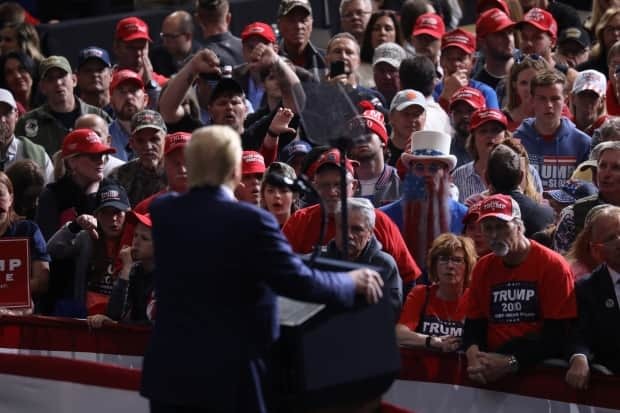
"This election is a referendum on Donald Trump," said O'Malley Dillon, who was an adviser on the Trudeau Liberals' 2015 Canadian federal campaign.
"A significant number of voters [believe] he's not doing a good job as president. And that's what we're going to focus on."
So Biden did something that ran against every fibre of the political reputation he had built over a nearly five-decade career: He let the other guy talk more.
When a radio interviewer who goes by the stage name Charlamagne Tha God accused Biden in May of running a low-energy, low-visibility campaign, the candidate fired back.
"The more he talks, the better off I am," Biden said. "I'm ahead in all the national polls."
That interview underscored the notion that, for Biden, speaking less might be the safer play.
WATCH | Joe Biden celebrates primary victory in South Carolina:
The only news headline generated by that exchange was an ill-conceived remark — Biden told Charlamagne that if he, an African-American voter, wasn't certain to favour Biden over Trump, then, "You ain't Black."
The lower-key campaign approach was enabled by the pandemic.
As live events became riskier and as physical distancing became politically popular, Biden mostly did virtual events from home, venturing out intermittently; the Trump campaign repeatedly mocked him for it.
It's an improbable late-career plot twist for Biden.
In past campaigns, Biden was the bigger talker
For the first few decades of his political life, he had a reputation as a limelight-loving motormouth.
In 1986, before his first presidential run, the Washington Post published a profile of the then-senator headlined: "Biden May Try To Talk His Way Into The White House."
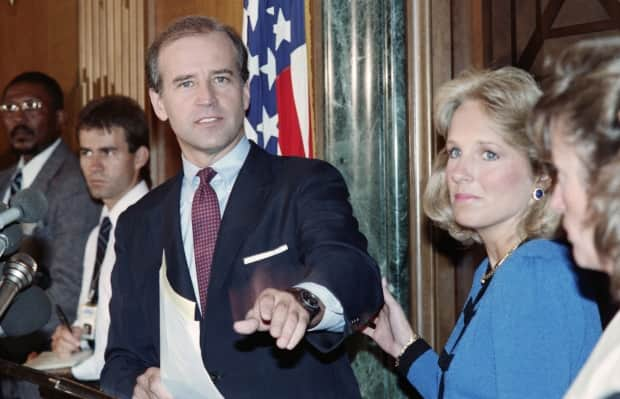
In that profile, a Republican senator praised Biden as the strongest potential candidate Democrats could field in 1988 — bright, tough, articulate, with just one major defect: "He goes on and on and on," said Sen. Orrin Hatch.
A Democratic staffer agreed with that scouting report on Biden's strengths — and that one weakness: "He talks too much…. Sometimes you roll your eyes to the back of your head."
Two decades later, there was a similar headline the next time he ran for president. A New York Times headline from 2007 said: "In Iowa Yard, Biden Talks (And Talks) About Experience."
Biden dropped out after a poor 2008 showing in Iowa. Meanwhile, he was building a relationship with a rookie senator on the committee he led, the Senate foreign relations committee: Barack Obama.
Not exactly known for being stingy with language himself, Obama reportedly once sent a note to an aide during a meandering Biden soliloquy that said: "Shoot. Me. Now."
A campaign staffer from Biden's first presidential run decades ago recognizes the irony in this moment — Biden possibly achieving his lifelong dream, by talking less.
And that is precisely the right approach to take against Trump, said Eric Andrus, now a communications executive in New York.
"When your opponent is shooting himself, get out of the way. Don't take one of those bullets," said Andrus, who was Biden's 1988 campaign press spokesperson in New Hampshire.
WATCH | What a Biden presidency could mean for Canada:
"That's exactly the strategy Biden has adopted. And exactly the one I would urge him to adopt."
Andrus said he recalls the dejection he felt when Biden's 1988 bid came to a far earlier, far more ignominious, halt.
Biden was forced from that race by a plagiarism scandal — he'd been repeating some lines, without attribution, from a speech by a British Labour leader. Biden also got caught lying about his academic performance.
It was so unnecessary to recycle someone else's lines, because Biden was a gifted orator, Andrus said: "He would amaze his audiences."
Yet Biden credited that early withdrawal with saving his life.
He soon had a near-fatal aneurysm and said he might not have received treatment in time if he'd been on the campaign trail.
He remained in the Senate, where he played a key role in what conservatives view as a seminal moment in the escalating partisanship over the U.S. Supreme Court. As head of the judiciary committee, Biden helped block the unpopular 1987 nomination of judge Robert Bork.
Andrus hasn't kept in touch with Biden but says he's rooting for him.
In a life filled with heartbreak, Biden has remained decent and kind to others, he said. "He's still the same old Joe in a lot of ways. That's very refreshing to see — and comforting," he said.
"He is [now] on the precipice of reaping a reward he's long sought. I'm being hopeful here."
His tragic political entry
Biden's first wife and daughter were killed in a car accident in 1972, weeks after he was first elected to the Senate at the near-record young age of 29.
At the time, Biden had thoughts of ending his own life, says a new biography written by The New Yorker's Evan Osnos. Biden moved out of the house he'd shared with his wife, Neilia, to escape the constant reminders of his loss.
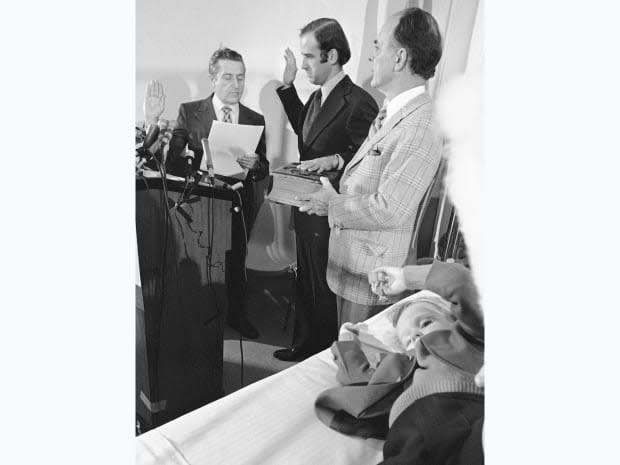
He said he stopped making long-term plans. Of his political career, Biden told the Washington Post in 1973, "It may last another six weeks" or "It may last another six years."
A profile the following year in The Washingtonian magazine professed to reveal Biden's attitude toward politics: personality matters more than policy in an election.
It's reflected in his view of how to get legislation passed.
Biden still believes personal relationships can lead to deals in Congress, a view deemed naive by many who consider the era of bipartisanship dead.
He insists that younger politicians in Washington are too quick to lecture their political opponents — and too slow to listen to their concerns.
Biden's attitude to politics — domestic and foreign
The collegial approach may be deemed anachronistic by many in this era of hyper-partisanship, but it allowed Biden to build a roster of friends in Congress, ranging from the socialist Sanders to the segregationist Strom Thurmond.
It's paid off this year in Sanders's full-throated support of Biden. The Vermont senator has backed him with more energy than he did Hillary Clinton in 2016: "I have a better relationship with Joe Biden than I had with [Clinton]," Sanders says.
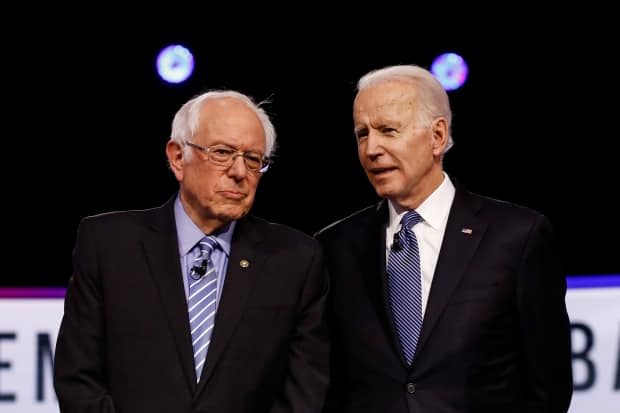
That faith in personal charm extends to foreign policy.
Leon Panetta, an official in the last Democratic administrations, describes listening to Biden get chummy in diplomatic phone chats with any of the numerous contacts he's made abroad since his Senate days leading the foreign relations committee.
"You didn't know whether he was talking to a world leader or the head of the political party in Delaware," Panetta told Osnos.
Julianne Smith, a former White House aide to Biden, told Osnos: "You can drop him into Kazakhstan or Bahrain, it doesn't matter — he's gonna find some Joe Blow that he met 30 years ago who's now running the place."
That biography, however, describes Biden as carrying some long-standing resentments.
He's written about the anger he feels, to this day, about being teased as a child about his stutter. He's occasionally spoken about what he sees as the snobbery of people who have fancy degrees from Ivy League universities.
In his recent autobiography, there's even a faint whiff of displeasure toward Obama.
Biden wrote that he was close to announcing a presidential run in 2016 — he had endorsements lined up and a headquarters picked out.
Yet, Biden writes in Promise Me, Dad, that Obama was "not encouraging," and senior members of Obama's staff were even blunter.
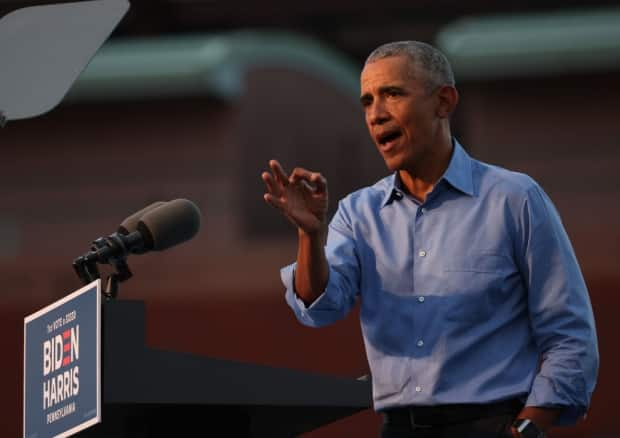
Some warned it would be too emotionally difficult — Biden had just lost a second child, his son Beau, to cancer.
And they warned he'd be crushed by Hillary Clinton.
"They were not subtle," Biden wrote of Obama's entourage discouraging him from running four years ago.
"If [Hillary] almost beat us [in 2008], they implied, she will definitely beat you…. The increasing pushback made everybody [on my team] a little bit angry and a lot determined."
Now Obama and Sanders are out campaigning for him, and he's favoured to become, next Tuesday, the oldest person ever elected U.S. president.
Problems Biden would face
Sanders is reportedly keen on a cabinet post in a Biden administration.
According to Osnos's biography, Biden has told Sanders, his old colleague and primary rival, that he intends to usher in the most activist progressive agenda since the first 100 days of Franklin Delano Roosevelt, who was first elected president in 1932.
He first has some obstacles to overcome.
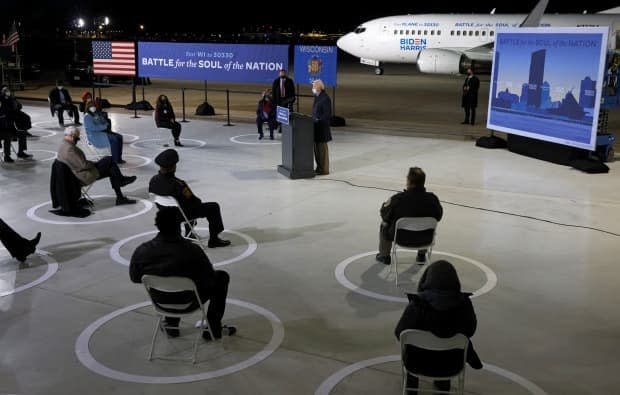
The most immediate involves the election. While the polls have him favoured, there are tight margins in several swing states and concerns about low turnout in the early voting in some minority communities.
There's no guarantee, either, that the Democrats will win the Senate.
And if Republicans retain control of that chamber, it is far from certain — to put it mildly — that they'd help Biden legislate anything substantive.
It's more likely that they'd investigate him. Republicans, who currently control the Senate, have already been probing his family's business ties.
Those controversial business ties are not new.
A number of articles over the past two years by newspaper and online mainstream-media outlets, and a book by a conservative author, have chronicled how several members of Biden's family have earned revenue from companies in the U.S. and abroad seeking political connections.
Now a former business contact of Biden's son, Hunter, Tony Bobulinski, has alleged that the former vice-president himself might have had some involvement — in 2017, when he was out of office, in a deal that was under discussion involving a Chinese energy company.
The Trump campaign has fumed at media outlets for not making this a bigger story in the election's final days.
Biden has said he never earned a penny of foreign revenue.
His campaign has said little else about this issue — other than to note that Trump's own family has a multitude of foreign business relationships and, unlike Biden, Trump still hasn't released his taxes.

With just a few days left before Tuesday's election, Biden is stepping up his public appearances and is visiting a handful of states.
His rallies tend to be smaller than Trump's — they involve pandemic precautions, with spectators practising physical distancing, watching from their cars.
Trump is still making many more stops. His crowds are larger and packed together, with most people not wearing masks.
Yet it's not clear those stops are helping Trump, given what surveys say about the election race and about Americans' view of his handling of COVID. A USA Today investigation even linked some of these Trump stops to spikes in COVID cases.
So this campaign ends as it began — Trump is No. 1 on the public stage and No. 2 in the polls, and he espouses an unflappable faith in the notion that more attention means more votes.
"We've got the biggest crowds in the history of politics," the president told reporters Friday.
"I think you will all be witness to that. Because there's never been anybody that has ever had bigger crowds or more enthusiasm."
Biden has already defeated one rival this year who got bigger, more enthusiastic crowds: that was Sanders, in the primaries.
On Tuesday, Biden aims for a repeat.
Ask CBC
What do you want to know about the U.S. election? Your questions help inform our coverage. Email us at Ask@cbc.ca

